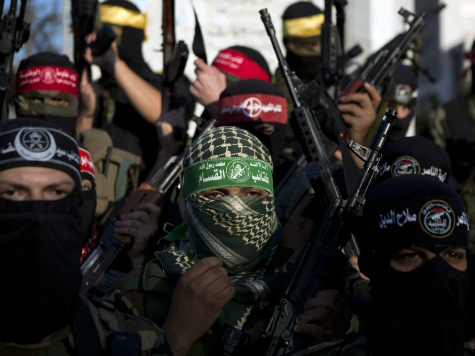In uniting the world’s bitterest enemies in at least a verbal campaign against it, ISIS has done what few ever thought possible.
Even though President Obama’s hopes to craft an international military coalition against ISIS looks to be stillborn, in one sense, the cast of forces now aligning against ISIS covers the widest imaginable gamut. Western nations can add to their ranks a growing list of wild extremist Islamic religious authorities throughout the Muslim world who condemn ISIS as a modern day iteration of the Kharijites; the early Islamist zealots who, in the first Muslim century, were expelled from Islam for waging war against all other Muslims it regarded as “infidels and apostates.”
This cast of characters is growing as long as their charges are unsettling. Saudi Arabia’s Hyper-Islamist Sheikh Nasser al-Shithri recently excommunicated ISIS, accusing them of being worse apostates “than Jews, Christians, or even heathens”. A serious charge indeed. Furthermore, how Muslim, can ISIS fighters really be, al-Shithri asks, if they do not even know how to properly veil and shackle their women?
Another hardcore Saudi extremist, Sheikh Saleh al-Fawzan, best known for religious rulings that support using young girls as sex slaves, claims that ISIS is a creation of “Zionists, Crusaders and Safavids.” “Safavids” is a degrading term used by Sunnis to insult Shias. Other Saudi Wahhabist figures also accuse of ISIS leaders of being dual Iranian-Israeli agents. Go figure.
Abu Muhammad al-Maqdisi, the former “spiritual adviser” to Abu Musab al-Zarqawi, the founder al-Qaeda in Iraq, the ISIS precursor group, now accuses ISIS of weakening Islam by dividing Muslims.
Syrian radio recently broadcast secretly recorded phone calls between ISIS fighters that a leading Syrian religious figure said showed ISIS as being ignorant of Islam and its teaching. The so-called ISIS Caliphate, said Sheik Hussam al-Atrush “has done,” he said, “nothing but incite hatred and disgust for the mujahideen.”
So far at least, ISIS does not seem all that interested in engaging in deep theological debates with other Muslims. As the Economist notes, ISIS seems well satisfied to make their by releasing pictures of “burqa clad women, and headless infidel men.”
ISIS is a “killing and destruction machine”, said none other than Abu Qatada, Bin Laden’s top man in Europe and a leading Jihadist ideologue who was recently extradited to Jordan from the UK after a long legal battle. ISIS fighters says Qatada, are the “dogs of hellfire.”
That President Obama’s nascent coalition contains such strange bedfellows only shows how extraordinarily difficult turning all that opposition into a coherent and capable fighting force will be.
That ISIS has emerged triumphant at all is very much a reflection of how disordered the Middle East has become. ISIS could never have taken control of northeast Syria had not the Assad regime allowed it. The battlefield reality is that the Syrian regime and ISIS are allies, not enemies.
The Syrian Air Force has held off bombing ISIS positions not out of any regard for Syrian civilians. It has been busy slaughtering Syrian civilians by the hundreds of thousands elsewhere in the country where the Assad regime has been fighting other rebel groups only slightly less extreme than ISIS. Assad enabled the rise of ISIS so that he should become its less extreme alternative.
For its part, until its seizure of Iraq’s second largest city Mosul in June when it acquired a huge cache of US weapons, ISIS was far busier fighting and weakening other Syrian rebel groups than it was fighting the Syrian regime. It was only after capturing the treasure trove of US made heavy artillery, armored vehicles, anti-tank and anti-aircraft missiles that ISIS became strong enough to challenge the Syrian regime directly. Its recent routes of Syrian forces in Raqqa province and the seizure of the Syrian Air Force base at al-Tabqa mark ISIS’ most significant military achievements to date.
Across the border in Iraq, ISIS could never have flourished without the efforts of the recently deposed Iraqi Prime Minister Nuri al Maliki to marginalize and even criminalize Iraqi Sunnis. There, it will be exceedingly difficult to recreate the Sahwa, or Sunni Awakening that defeated, with US military support, the ISIS precursor terror army, al-Qaeda in Iraq, primarily because there are no more US forces in Iraq to help and protect the Sunnis.
Iraq’s new government is contemplating a model that would support and fund local and regional militias in each Sunni province of Iraq. Why Baghdad thinks these groups will fight any more effectively than its own army which withered and fled at the first signs of battle is anyone’s guess.
Intelligence groups now estimate that up to one third of ISIS’s reputed 30,000 to 45,000 trained fighters are so called “foreign fighters,” with one third of those believed to be citizens of EU nations with visa free access to the United States.

COMMENTS
Please let us know if you're having issues with commenting.